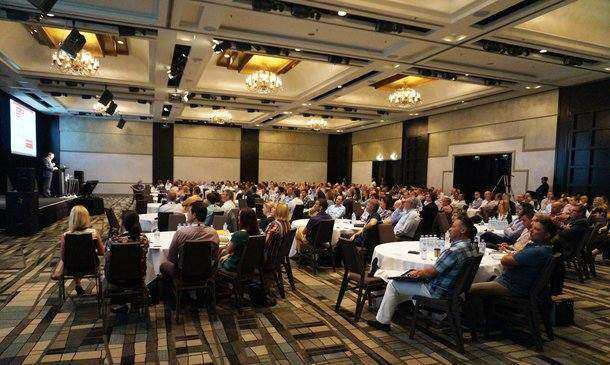FGC Chief Executive, Katherine Rich, shares highlights from the FGC’s recent annual conference.
The FMCG industry remains highly competitive, united and in excellent heart – that was the clear message from the NZ Food and Grocery Council’s recent annual conference, which was held at the Gold Coast in Australia.
 Many of the 320 delegates came away saying it was the best they had attended, and with the closing remarks of FGC Chair Veronique Cremades ringing in their ears. She said the conference had equipped members with “a tool box of food for thought, leveraging on the past and envisioning the future”, and was a great celebration for “a highly competitive and united industry”. She cautioned that in the rush of new technology sweeping the industry it was important for companies to stay people-oriented as they adapted to a changing marketplace.
Many of the 320 delegates came away saying it was the best they had attended, and with the closing remarks of FGC Chair Veronique Cremades ringing in their ears. She said the conference had equipped members with “a tool box of food for thought, leveraging on the past and envisioning the future”, and was a great celebration for “a highly competitive and united industry”. She cautioned that in the rush of new technology sweeping the industry it was important for companies to stay people-oriented as they adapted to a changing marketplace.
They were messages that reflected a year of record membership and record attendance at FGC forums, and were echoed by industry speakers throughout the two days who contributed to a buzz that was particularly evident in the networking sessions.

The conference theme was ‘The New Reality for Grocery Suppliers in New Zealand and Australia’, and opening speaker Terry O’Brien, the CEO of major Australian food supplier Simplot, set the scene perfectly with a message on the arrival of “discounters” such as Aldi in that market. He said they were redefining value and putting pressure on the established retailers, and New Zealand should prepare for their arrival. Suppliers would need to be creative and understand customers’ needs to ensure they retained shelf space.
Gareth Edgecombe of The Comfort Group gave an analysis of the Aldi formula and why they were so successful – having a competitive procurement strategy and high standards which they bought against, and which resulted in building customer trust.
Preparing to meet future requirements

Tim Hart of Ridley Corporation took a sobering look at the future of the world’s food supply, pointing out that by 2050 there would be 50 billion people – three worlds – to feed. He said if producers gave consumers everything they wanted – such as organics – they wouldn’t be able to feed them all.
Workshops were a big feature of the conference. They included: building a performance culture (Owen Eastwood of Hoko Culture), hidden motivators of retailing (business coach Dan Meiklejohn), what the new legislation means for health and safety in the workplace, and talent and retention in the industry and how businesses can prepare to meet future requirements (Kelly Smith). I managed to skip between a few, and two of particular interest to the industry right now caught my eye:
- Neil Rechlin of NextGen gave a line-by-line review of the Australian Food and Grocery Code of Conduct, whose intent is commercial certainty, transparency and visibility. His advice for New Zealand suppliers selling into Australia was that they should not sign anything the retailer puts on the table – that each element can be negotiated. His three rules: put everything in writing, use Code language, be Code aware.
- David Zehner of Bain & Co discussed competition for shelf space as private labels flourish in Australia. His message: higher prices invite competition, and retailers are taking the biggest share of these prices. Suppliers could either cut costs or use the new environment as an opportunity to change their operations and approach in a way that could help them adapt and outperform their competitors.
There was the annual retailer performance update by way of Lance Dobson and the Nielsen Barometer, while a first was me interviewing Steve Anderson and Chris Quin from Foodstuffs on their latest news, interactions with suppliers, and industry developments. It was an informal chat that was well received.
Rob Smith, CEO of Carpet Court, and a long-time FMCG operative, was a revelation on how far grocery has come in recent years, while Carl MacInnes of Fonterra imparted his wisdom on winning the war on the shelf “one nudge at a time”. Richard Harman’s excellent political update ‘Waiting for Winston’ had us all thinking ahead to election year, while irreverent Aussie Peter FitzSimons was the perfect way to end our best conference yet.



